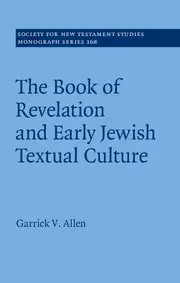

The Book of Revelation and Early Jewish Textual Culture
in Society for New Testament Studies Monograph Series
Publisher
Cambridge University Press
Published
7/3/2017
ISBN-13
9781107198128
The Book of Revelation and Early Jewish Textual Culture explores the relationship between the writing of Revelation and its early audience, especially its interaction with Jewish Scripture. It touches on several areas of scholarly inquiry in biblical studies, including modes of literary production, the use of allusions, practices of exegesis, and early engagements with the Book of Revelation. Garrick Allen brings the Book of Revelation into the broader context of early Jewish literature, including the Dead Sea Scrolls and other important works. Arguing that the author of the New Testament Apocalypse was a 'scribal expert, someone who was well-versed in the content of Jewish Scripture and its interpretation', he demonstrates that John was not only a seer and prophet, but also an erudite reader of scripture.
- Examines the Book of Revelation through the lens of Jewish textual culture
- Explores the method and shape of allusions in Revelation
- Argues that the author of the Book of Revelation was an erudite literary expert
- Table of Contents
- 1. The scribal apocalypse and early Jewish textual culture
- 2. Textual pluriformity in Jewish and Christian antiquity
- 3. Borrowing prophetic words: textual form and access to tradition
- 4. Reading Zechariah with John: techniques of Reuse, exegetical resources, and textual hermeneutics
- 5. Reading Zechariah in early Judaism
- 6. 'These words are faithful and true' (Rev. 22.6)
- Appendix 1
- Appendix 2.